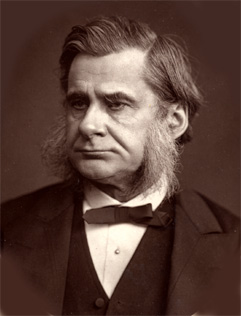User blogs

THOMAS H. HUXLEY (1825-1895), English biologist and evolutionist, famous as “Darwin’s bulldog”
1. In his article Science and Morals (1886), Huxley stated:
“The student of nature, who starts from the axiom of the universality of the law of causation, cannot refuse to admit an eternal existence; if he admits the conservation of energy, he cannot deny the possibility of an eternal energy; if he admits the existence of immaterial phenomena in the form of consciousness, he must admit the possibility, at any rate, of an eternal series of such phenomena; and, if his studies have not been barren of the best fruit of the investigation of nature, he will have enough sense to see that when Spinoza says, ‘Per Deum intelligo ens absolute infinitum, hoc est substantiam constantem infinitis attributis,’ the God so conceived is one that only a very great fool would deny, even in his heart. Physical science is as little Atheistic as it is Materialistic.” (Huxley 1893-94, Collected Essays, Vol. IX, p. 140).
2. “The more I know intimately of the lives of other men (to say nothing of my own), the more obvious it is to me that the wicked does not flourish nor is the righteous punished. But for this to be clear we must bear in mind what almost all forget, that the rewards of life are contingent upon obedience to the whole law – physical as well as moral – and that moral obedience will not atone for physical sin, or vice versa.
The ledger of the Almighty is strictly kept, and every one of us has the balance of his operations paid over to him at the end of every minute of his existence.” (Huxley 1903, Vol. I, Ch. 1.16).
"In a letter to Kingsley, Huxley said that he believed in 'the Divine Government' of the universe." (Goudge 1967, Vol. IV, p. 103).
3. In “On Providence” (An Apologetic Irenicon, 1892), Huxley wrote:
“If the doctrine of a Providence is to be taken as the expression, in a way ‘to be understanded of the people,’ of the total exclusion of chance from a place even in the most insignificant corner of Nature; if it means the strong conviction that the cosmic process is rational; and the faith that, throughout all duration, unbroken order has reigned in the universe – I not only accept it, but I am disposed to think it the most important of all truths. As it is of more consequence for a citizen to know the law than to be personally acquainted with the features of those who will surely carry it into effect, so this very positive doctrine of Providence, in the sense defined, seems to me far more important than all the theorems of speculative theology.” (Huxley 1903, Vol. III, Ch. 3.9; see also Coley & Hall 1980, 33).
